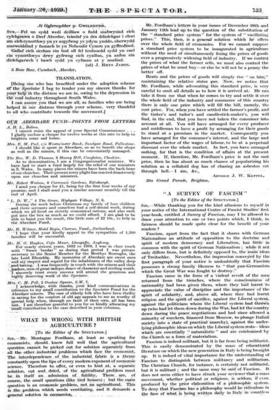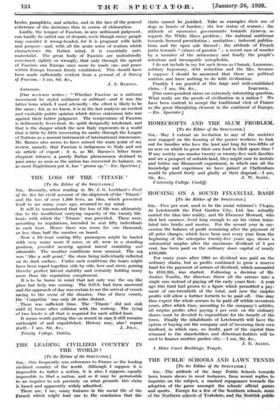" A SURVEY OF FASCISM " [To the Editor of
the SPECTATOR.] SIR,—While thanking you for the kind allusions to myself in your notice of the International Centre of Fascist Studies' first year-book, entitled A Survey of Fascism, may I be allowed to draw your attention to one or two points which, I think; in fairness should be made quite clear for the benefit of your readers ?
Fascism, apart from the fact that it shares with German Nationalism an attitude of opposition: to the doctrine and spirit of modern democracy and Liberalism, heS little" ih common with the spirit of German Nationalism ; while it nit only differs from, but is definitely opposed to, the inihi ideas of Treitschke. Nevertheless, the impression conveYed by the first paragraph of your notice is undoubtedly that Fascism possesses a strong familY likeness to " that pan-GernuiniStn which the Great War was fought to destroy." Fascism came in the forin of a-violent revolt of the men returned -from the trenches', where the consciousness- Of nationality had been given them, where they had leirnt `too appreciate the value of discipline and the' himortanee'orthe spirit of solidarity, and, above all, where they had learnt religion and the spirit of sierifice, against the Liberal systeni, against the politicians whOiri.the Liberal system had thrdiiii up (who had let them down' during the War, had let the country down during the peace negotiations and had since allowed a minority of wreckeri, financed froM Moscow, to. plunge Italiafi society into a State of 'prictiCal 'anarchy), 'against the under- lying philosophic ideas on which the Liberal system rests—ideas which are essentially " naturalistic " and are coiidemiied'by the•Church as a form of materialism.
Fascism is indeed militant, but it is far from being militarist. This is easily demonstrated by the mass of educational literature on which the new generation in Italy is being brought up. It is indeed of vital importance for the understanding of Fascism to distinguish between militancy and militarism. The Christian Church, for instance, is certainly not militarist, but it is militant ; and the same may be said of Fascism. It does not seem either to have struck your reviewer that a Mass movement, whether political or religious, is seldom, if ever. produced by the prior elaboration of a philosophic system. To deny that Fascism has a philosophy would be ridiculous in the face of what is being written daily in Italy in' countless books, pamphlets, and articles, And in the face of the general coherence of the doctrines thus in course of elaboration.
Lastly, the temper of Fascism, in any. unbiassed, judgment, can hardly be called one of.despaironven though many people• may consider it wrong-headed, for it is pregnant with faith and purpose—and, with all the acute sense of realism which characterizes the Italian mind, it is essentially anti- materialist.. The great body of Fascists are undoubtedly convinced, rightly or wrongly, that only through the spread of Fascism. can Europe once more be. made one, and peace within Europe become firmly established. This should have been made sufficiently evident from a perusal of A Survey of Fascism.—I am, Sir, &c.,
[Our reviewer writes : " Whether Fascism as a national movement be styled militarist or militant—and it was the latter term which I used advisedly—the effect is likely to be the same ; for, as we know, it is in the last analysis-an excited and excitable public opinion which drives statesmen into war against their better judgment. The temperature of Fascism is deliberately fever-heat, its spirit designedly intolerant, and that is the danger which the new Italy represents in a world that is little by little recovering its sanity through the League of Nations as a normal instrument of international intercourse. Mr. Barnes also seems to have missed the main point of my review, namely, that Fascism is indigenous to Italy and not an article of export ; it is, as Mr. Barnes's letter bears eloquent 'witness, a purely Italian phenomenon destined to pass away as soon as the nation has recovered its balance, or, as`most Englishmen put it, has " grown up."—En. Speck tor.]









































 Previous page
Previous page